信息战与网络资源 英文版
- 格式:ppt
- 大小:876.00 KB
- 文档页数:24
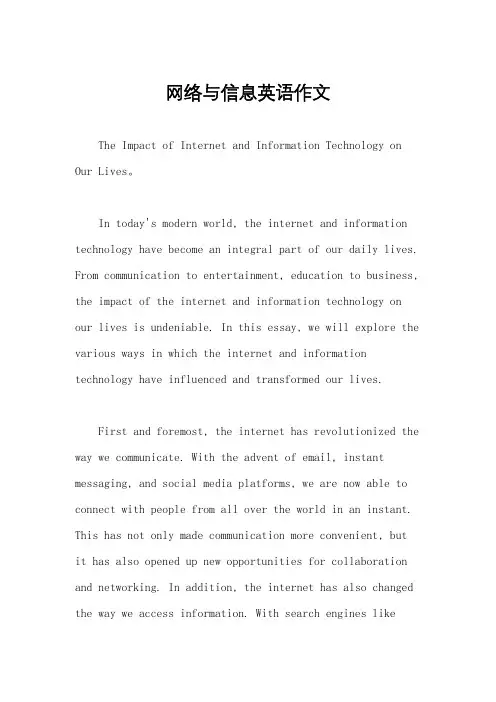
网络与信息英语作文The Impact of Internet and Information Technology on Our Lives。
In today's modern world, the internet and information technology have become an integral part of our daily lives. From communication to entertainment, education to business, the impact of the internet and information technology on our lives is undeniable. In this essay, we will explore the various ways in which the internet and information technology have influenced and transformed our lives.First and foremost, the internet has revolutionized the way we communicate. With the advent of email, instant messaging, and social media platforms, we are now able to connect with people from all over the world in an instant. This has not only made communication more convenient, butit has also opened up new opportunities for collaboration and networking. In addition, the internet has also changed the way we access information. With search engines likeGoogle, we can now find answers to almost any question within seconds. This has not only made learning more accessible, but it has also empowered individuals to become more informed and knowledgeable.Furthermore, the internet has also had a profound impact on the way we consume media and entertainment. With the rise of streaming services like Netflix and Spotify, we now have access to a vast library of movies, TV shows, and music at our fingertips. This has not only changed the way we consume media, but it has also disrupted traditional industries like cable television and physical music sales. In addition, the internet has also transformed the way we shop. With the rise of e-commerce platforms like Amazon and Alibaba, we can now purchase almost anything online and have it delivered to our doorstep. This has not only made shopping more convenient, but it has also created new opportunities for businesses to reach customers.Moreover, the internet and information technology have also had a significant impact on the way we work and do business. With the rise of remote work and digitalcollaboration tools, we are now able to work from anywhere in the world and collaborate with colleagues in real-time. This has not only made work more flexible, but it has also opened up new opportunities for global collaboration and innovation. In addition, the internet has also transformed the way businesses operate. With the rise of digital marketing and e-commerce, businesses can now reach customers on a global scale and sell their products and services online. This has not only expanded the reach of businesses, but it has also created new opportunities for entrepreneurs and small businesses to thrive.In conclusion, the internet and information technology have had a profound impact on our lives in countless ways. From communication to entertainment, education to business, the internet has transformed the way we live, work, and interact with the world around us. As we continue to embrace and adapt to these changes, it is important to recognize the opportunities and challenges that come with the digital age. Ultimately, the internet and information technology have the power to shape our future in ways we have yet to imagine.。
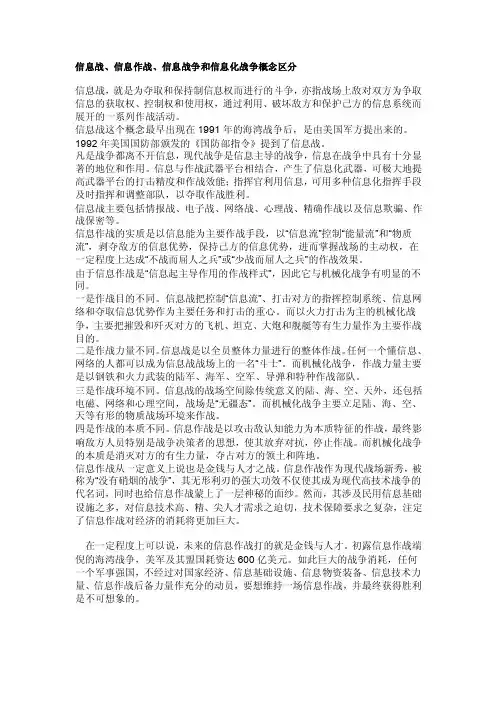
信息战、信息作战、信息战争和信息化战争概念区分信息战,就是为夺取和保持制信息权而进行的斗争,亦指战场上敌对双方为争取信息的获取权、控制权和使用权,通过利用、破坏敌方和保护己方的信息系统而展开的一系列作战活动。
信息战这个概念最早出现在1991年的海湾战争后,是由美国军方提出来的。
1992年美国国防部颁发的《国防部指令》提到了信息战。
凡是战争都离不开信息,现代战争是信息主导的战争,信息在战争中具有十分显著的地位和作用。
信息与作战武器平台相结合,产生了信息化武器,可极大地提高武器平台的打击精度和作战效能;指挥官利用信息,可用多种信息化指挥手段及时指挥和调整部队,以夺取作战胜利。
信息战主要包括情报战、电子战、网络战、心理战、精确作战以及信息欺骗、作战保密等。
信息作战的实质是以信息能为主要作战手段,以“信息流”控制“能量流”和“物质流”,剥夺敌方的信息优势,保持己方的信息优势,进而掌握战场的主动权,在一定程度上达成“不战而屈人之兵”或“少战而屈人之兵”的作战效果。
由于信息作战是“信息起主导作用的作战样式”,因此它与机械化战争有明显的不同。
一是作战目的不同。
信息战把控制“信息流”、打击对方的指挥控制系统、信息网络和夺取信息优势作为主要任务和打击的重心。
而以火力打击为主的机械化战争,主要把摧毁和歼灭对方的飞机、坦克、大炮和舰艇等有生力量作为主要作战目的。
二是作战力量不同。
信息战是以全员整体力量进行的整体作战。
任何一个懂信息、网络的人都可以成为信息战战场上的一名“斗士”。
而机械化战争,作战力量主要是以钢铁和火力武装的陆军、海军、空军、导弹和特种作战部队。
三是作战环境不同。
信息战的战场空间除传统意义的陆、海、空、天外,还包括电磁、网络和心理空间,战场是“无疆态”。
而机械化战争主要立足陆、海、空、天等有形的物质战场环境来作战。
四是作战的本质不同。
信息作战是以攻击敌认知能力为本质特征的作战,最终影响敌方人员特别是战争决策者的思想,使其放弃对抗,停止作战。

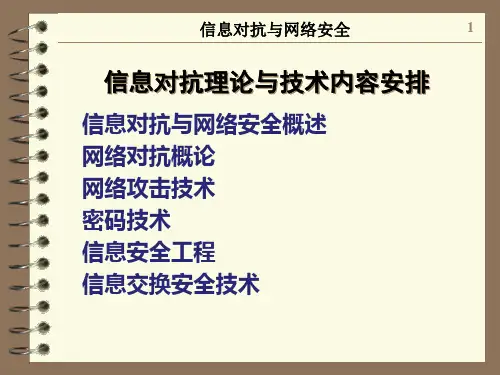
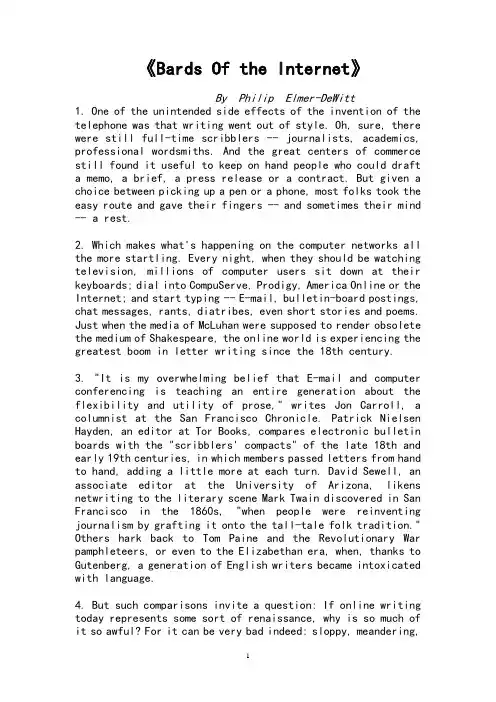
《Bards Of the Internet》By Philip Elmer-DeWitt1. One of the unintended side effects of the invention of the telephone was that writing went out of style. Oh, sure, there were still full-time scribblers -- journalists, academics, professional wordsmiths. And the great centers of commerce still found it useful to keep on hand people who could draft a memo, a brief, a press release or a contract. But given a choice between picking up a pen or a phone, most folks took the easy route and gave their fingers -- and sometimes their mind -- a rest.2. Which makes what's happening on the computer networks all the more startling. Every night, when they should be watching television, millions of computer users sit down at their keyboards; dial into CompuServe, Prodigy, America Online or the Internet; and start typing -- E-mail, bulletin-board postings, chat messages, rants, diatribes, even short stories and poems. Just when the media of McLuhan were supposed to render obsolete the medium of Shakespeare, the online world is experiencing the greatest boom in letter writing since the 18th century.3. "It is my overwhelming belief that E-mail and computer conferencing is teaching an entire generation about the flexibility and utility of prose," writes Jon Carroll, a columnist at the San Francisco Chronicle. Patrick Nielsen Hayden, an editor at Tor Books, compares electronic bulletin boards with the "scribblers' compacts" of the late 18th and early 19th centuries, in which members passed letters from hand to hand, adding a little more at each turn. David Sewell, an associate editor at the University of Arizona, likens netwriting to the literary scene Mark Twain discovered in San Francisco in the 1860s, "when people were reinventing journalism by grafting it onto the tall-tale folk tradition." Others hark back to Tom Paine and the Revolutionary War pamphleteers, or even to the Elizabethan era, when, thanks to Gutenberg, a generation of English writers became intoxicated with language.4. But such comparisons invite a question: If online writing today represents some sort of renaissance, why is so much of it so awful? For it can be very bad indeed: sloppy, meandering,puerile, ungrammatical, poorly spelled, badly structured and at times virtually content free. "HEY 1!" reads an all too typical message on the Internet, "I THINK METALLICA IZ REEL KOOL DOOD! 1"5. One reason, of course, is that E-mail is not like ordinary writing. "You need to think of this as 'written speech,' " says Gerard Van der Leun, a literary agent based in Westport, Connecticut, who has emerged as one of the pre-eminent stylists on the Net. "These things are little more considered than coffeehouse talk and a lot less considered than a letter. They're not to have and hold; they're to fire and forget." Many online postings are composed "live" with the clock ticking, using rudimentary word processors on computer systems that charge by the minute and in some cases will shut down without warning when an hour runs out6. That is not to say that with more time every writer on the Internet would produce sparkling copy. Much of the fiction and poetry is second-rate or worse, which is not surprising given that the barriers to entry are so low. "In the real world," says Mary Anne Mohanraj, a Chicago-based poet, "it takes a hell of a lot of work to get published, which naturally weeds out a lot of the garbage. On the Net, just a few keystrokes sends your writing out to thousands of readers."7. But even among the reams of bad poetry, gems are to be found. Mike Godwin, a Washington-based lawyer who posts under the pen name "mnemonic," tells the story of Joe Green, a technical writer at Cray Research who turned a moribund discussion group called rec.arts.poems into a real poetry workshop by mercilessly critiquing the pieces he found there. "Some people got angry and said if he was such a god of poetry, why didn't he publish his poems to the group?" recalls Godwin. "He did, and blew them all away." Green's Well Met in Minnesota, a mock-epic account of a face-to-face meeting with a fellow network scribbler, is now revered on the Internet as a classic. It begins, "The truth is that when I met Mark I was dressed as the Canterbury Tales. Rather difficult to do as you might suspect, but I wanted to make a certain impression."8. The more prosaic technical and political discussion groups, meanwhile, have become so crowded with writers crying forattention that a Darwinian survival principle has started to prevail. "It's so competitive that you have to work on your style if you want to make any impact," says Jorn Barger, a software designer in Chicago. Good writing on the Net tends to be clear, vigorous, witty and above all brief. "The medium favors the terse," says Crawford Kilian, a writing teacher at Capilano College in Vancouver, British Columbia. "Short paragraphs, bulleted lists and one-liners are the units of thought here."9. Some of the most successful netwriting is produced in computer conferences, where writers compose in a kind of collaborative heat, knocking ideas against one another until they spark. Perhaps the best examples of this are found on the WELL, a Sausalito, California, bulletin board favored by journalists. The caliber of discussion is often so high that several publications -- including the New York Times and the Wall Street Journal -- have printed excerpts from the WELL.10. Curiously, what works on the computer networks isn't necessarily what works on paper. Netwriters freely lace their prose with strange acronyms and "smileys," the little faces constructed with punctuation marks and | intended to convey the winks, grins and grimaces of ordinary conversations. Somehow it all flows together quite smoothly. On the other hand, polished prose copied onto bulletin boards from books and magazines often seems long- winded and phony. Unless they adjust to the new medium, professional writers can come across as self-important blowhards in debates with more nimble networkers. Says Brock Meeks, a Washington-based reporter who covers the online culture for Communications Daily: "There are a bunch of hacker kids out there who can string a sentence together better than their blue- blooded peers simply because they log on all the time and write, write, write."11. There is something inherently democratizing -- perhaps even revolutionary -- about the technology. Not only has it enfranchised thousands of would-be writers who otherwise might never have taken up the craft, but it has also thrown together classes of people who hadn't had much direct contact before: students, scientists, senior citizens, computer geeks, grass-roots (and often blue-collar) bulletin-board enthusiasts and most recently the working press.12. "It's easy to make this stuff look foolish and trivial," says Tor Books' Nielsen Hayden. "After all, a lot of everyone's daily life is foolish and trivial. I mean, really, smileys? Housewives in Des Moines who log on as VIXEN?"13. But it would be a mistake to dismiss the computer-message boards or to underestimate the effect a lifetime of dashing off E-mail will have on a generation of young writers. The computer networks may not be Brook Farm or the Globe Theatre, but they do represent, for millions of people, a living, breathing life of letters. One suspects that the Bard himself, confronted with the Internet, might have dived right in and never logged off.1.电话发明的一个意想不到的副作用就是使写作脱离原有的格式(风格)。
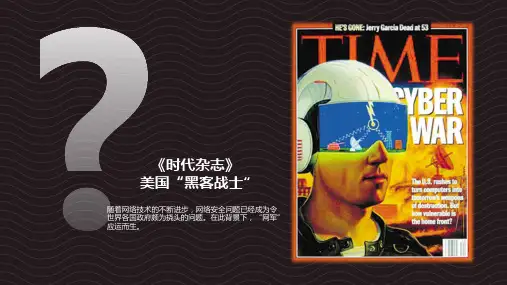
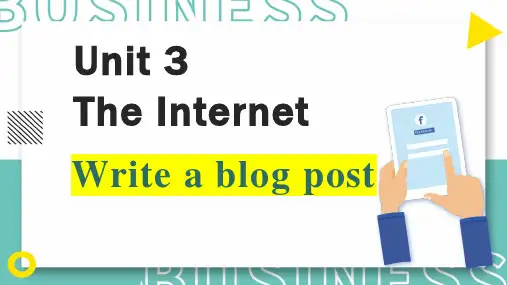
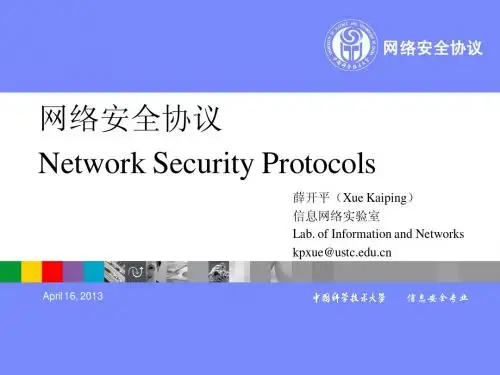

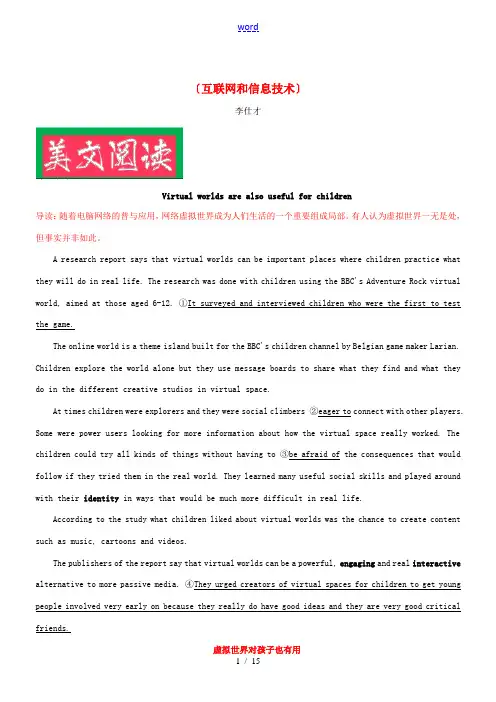
〔互联网和信息技术〕李仕才Virtual worlds are also useful for children导读:随着电脑网络的普与应用,网络虚拟世界成为人们生活的一个重要组成局部。
有人认为虚拟世界一无是处,但事实并非如此。
A research report says that virtual worlds can be important places where children practice what they will do in real life. The research was done with children using the BBC's Adventure Rock virtual world, aimed at those aged 6-12. ①It surveyed and interviewed children who were the first to test the game.The online world is a theme island built for the BBC's children channel by Belgian game maker Larian. Children explore the world alone but they use message boards to share what they find and what they do in the different creative studios in virtual space.At times children were explorers and they were social climbers ②eager to connect with other players. Some were power users looking for more information about how the virtual space really worked. The children could try all kinds of things without having to ③be afraid of the consequences that would follow if they tried them in the real world. They learned many useful social skills and played around with their identity in ways that would be much more difficult in real life.According to the study what children liked about virtual worlds was the chance to create content such as music, cartoons and videos.The publishers of the report say that virtual worlds can be a powerful, engaging and real interactive alternative to more passive media. ④They urged creators of virtual spaces for children to get young people involved very early on because they really do have good ideas and they are very good critical friends.虚拟世界对孩子也有用根据一份研究报告,虚拟世界也是很重要的地方。
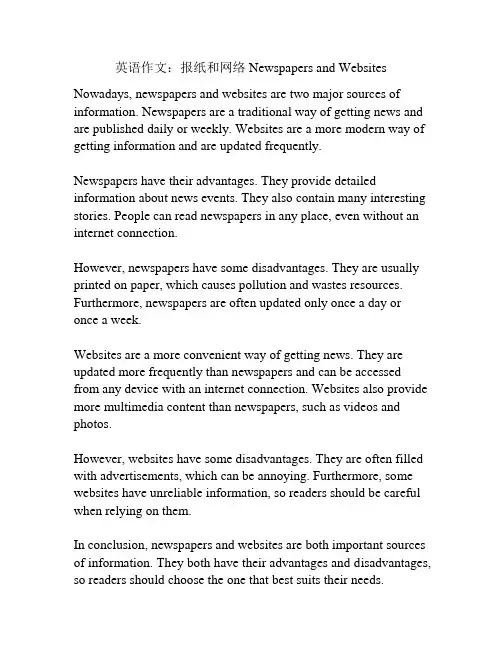
英语作文:报纸和网络 Newspapers and Websites Nowadays, newspapers and websites are two major sources of information. Newspapers are a traditional way of getting news and are published daily or weekly. Websites are a more modern way of getting information and are updated frequently.Newspapers have their advantages. They provide detailed information about news events. They also contain many interesting stories. People can read newspapers in any place, even without an internet connection.However, newspapers have some disadvantages. They are usually printed on paper, which causes pollution and wastes resources. Furthermore, newspapers are often updated only once a day or once a week.Websites are a more convenient way of getting news. They are updated more frequently than newspapers and can be accessed from any device with an internet connection. Websites also provide more multimedia content than newspapers, such as videos and photos.However, websites have some disadvantages. They are often filled with advertisements, which can be annoying. Furthermore, some websites have unreliable information, so readers should be careful when relying on them.In conclusion, newspapers and websites are both important sources of information. They both have their advantages and disadvantages, so readers should choose the one that best suits their needs.。
一.名词解释1.信息战:信息战是为夺取和保持制信息权而进行的斗争,亦指战场上敌对双方为争取信息的获取权、控制权和使用权,通过利用、破坏敌方和保护己方的信息系统而展开的一系列作战活动。
信息战这个概念最早出现在1991年的海湾战争后,是由美国军方提出来的。
1992年美国国防部颁发的《国防部指令》提到了信息战。
信息战不只是一些能力,它要与网络空间结合以发挥威力。
2.信息作战:信息作战:为增强和保护己方收集、处理和利用信息的能力而采取的连续性军事行动,目的是为了夺取各种军事行动中的优势,包括对敌人信息和决策能力的利用和阻止3.信息化战争:信息化战争是一种战争形态,是指在信息时代核威慑条件下,交战双方以信息化军队为主要作战力量,在陆、海、空、天、电等全维空间展开的多军兵种一体化的战争,大量的运用具有信息技术,新材料技术,新能源技术,生物技术,航天技术,海洋技术等当代高新技术水平的常规的武器装备,并采取相应的作战方法,在局部地区进行的,目的手段规模均较有限的战争。
4.网络中心战:网络中心战(Network-centric warfare,NCW),现多称网络中心行动(network-centric operations,NCO)是一种美国国防部所创的新军事指导原则,以求化资讯优势为战争优势。
其做法是用极可靠的网络联络在地面上分隔开但资讯充足的部队,这样就可以发展新的组织及战斗方法。
这种网络容许人们分享更多资讯、合作及情境意识,以致理论上可以令各部一致,指挥更快,行动更有效。
这套理论假设用极可靠的网络联系的部队更能分享资讯;资讯分享会提升资讯质素及情境意识;分享情境意识容许合作和自发配合,这些假设大大增加行动的效率。
5.制信息权:制信息权又叫制电子权,就是在一定时空范围内控制战场信息的主导权。
在信息化战争中,争夺制信息权的信息作战通常先于其它作战行动展开并贯穿于整个战争的全过程,甚至有可能构成独立的作战阶段。
网络中心战(Network-centric warfare,NCW),现多称网络中心行动(network-centric operations,NCO)是一种美国国防部所创的新军事指导原则,以求化资讯优势为战争优势。
其做法是用极可靠的网络联络在地面上分隔开但资讯充足的部队,这样就可以发展新的组织及战斗方法。
这种网络容许人们分享更多资讯、合作及情境意识,以致理论上可以令各部一致,指挥更快,行动更有效。
这套理论假设用极可靠的网络联系的部队更能分享资讯;资讯分享会提升资讯质素及情境意识;分享情境意识容许合作和自发配合,这些假设大大增加行动的效率。
背景与历史1996年,海军上将威廉·欧文斯在他于美国空军国家安全研究所写的文章《系统中的新兴系统》中引入“系统集成”的概念。
威廉·欧文斯描述了一组有助情境意识、目标评估及分散火力分配的情报监侦系统、指挥系统、精准导引弹药的系统如何略带偶然地发展出来。
同年,美国参谋长联席会议发表联合展望2010(或称2010联战愿景),引入军事概念全谱优势(或称全方位主宰),描述美国的军事能力——无论和平行动或武力行动,都可以资讯优势主宰战场。
1998年,网络中心战的概念在美国海军研究所会议录文集阿瑟·塞布罗夫斯基海军中将(Vice Admiral Arthur Cebrowski)和约翰·加特斯卡(John Gartska)合著的一篇文章正式公开。
其后嘉契卡和助理国防部长(网络与资讯整合)办公室研究主任大卫·艾伯茨(David S. Alberts, Director of Research, OASD-NII )和迈特公司的弗雷德·斯坦(Fred Stein, Mitre Corporation)写了一本书“Network Centric Warfare”,深入讨论这些概念。
这本书由华盛顿国防部指挥与控制研究计划(CCRP)出版,借鉴商业机构,利用资讯沟通科技以改善形势分析、准确管理库存与生产及客户关系之道,发展一套新的战事理论。
军事英语口语系列:网络战争277. The net warfare by computer has no "front line".靠计算机在网上作战是没有"前线"的。
278. The soldiers must become forward eyes and ears.士兵们必须成为千里眼顺风耳。
279. Many military services rely on computers for information gathering, targeting, force deployment, etc.很多军事部门依靠电脑进行情报搜集、目标瞄准及军队部署等。
280. The Internet enables us to know all the things of the world.因特网使我们能了解世界上所有事情。
281. Computers were not designed to be weapons.计算机不是设计为武器的。
282. Adopting civilian inventions for military use as weapons has not been unusual.采用民用发明用于军事作为武器已经不是不正常的了。
283. With a computer one can attack a website in country A from country B.利用一台计算机人们就可以从B国攻击A国的一个网站。
284. And he can make it look like the attack came from country C.而且还弄得好像是攻击来自C国。
285. To be most effective, a military force would want its best and most talented soldier.为了形成最佳战斗力,每支部队都想拥有属于自己的最好的、最有才能的士兵。